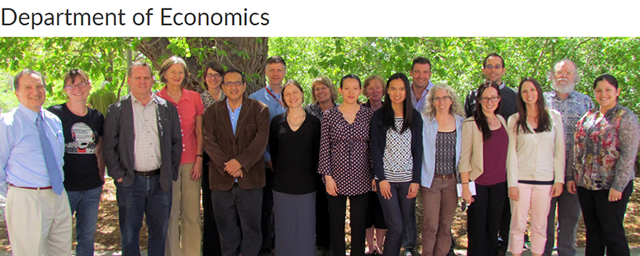
Economics ETDs
Publication Date
Summer 7-15-2022
Abstract
This dissertation is a collection of chapters that demonstrate the relationship between return migration, human capital, and labor outcomes in the origin developing countries. Return migration is an intrinsic part of the cycle of international migration and development. Migrants acquire new skills, accumulate human capital and savings during their stay abroad. When they return, this accumulated capital may generate benefits for the left behind family members but may also affect their reintegration into the labor markets in the origin countries.
In my first chapter, I estimate the effect of a return migrant in the household on the schooling outcomes of children and adolescents in Mexico. My second chapter examines how the presence of a return migrant in the household affects the school-work decisions of adolescents, particularly focusing on the type of jobs that adolescents in return migrant households engage in. In the third chapter, I investigate the labor outcomes and occupational mobility of returnees in Ghana who have migration experiences from abroad.
The US-Mexico corridor represents one of the most massive migrant movements in human history. Since 2007 the trend has reversed, with more Mexican migrants returning to their homes than those moving to the U.S. The experiences gained abroad benefit not just the return migrants but may also cause spillover effects that enhance the living conditions of their households. In the first chapter, I establish the causal effect of a return migrant in the household on schooling-for-age and school attendance of children aged 6-19 in Mexican households. Using data from the 2010 Mexican Census, I employ an instrumental variable approach to address the endogeneity of treatment status. I use an index of U.S. interior immigration enforcement interacted with municipality migrant shares to the U.S. states as the source of exogenous variation. I find an increase in school attendance and an increase in schooling-for-age of children in households with return migrants. I speculate these improvements to be driven by the migrants' experience and accumulation of savings in the U.S. My paper suggests return migration from a developed to a developing country as a mechanism through which migrant flows may benefit origin developing countries worldwide.
My second chapter examines the causal effect of a return migrant in the household on the school-work tradeoff and the occupational choices of adolescents aged 12-19 years in Mexico. I address the endogeneity of the presence of a return migrant by using exogenous variation in the municipality's exposure to U.S. interior enforcement interacted with the municipality migrant shares. My results suggest an increase in the probability of school attendance, a decrease in labor market participation, and a decrease in the probability of working and going to school simultaneously for children of households with return migrants relative to non-migrant households. Moreover, I find a decrease in the probability of employment in wage/salaried work, and an increase in self-employment among children in return migrant households. These improvements are likely driven by the migrants' experience, accumulation of human and financial capital in the U.S, as well as better labor market opportunities when they return. Policies aimed at facilitating the return of international migrants may substantially improve the quality of education and can act as a channel to reduce child labor.
Migration schemes and demographic characteristics of return migrants in Ghana vary greatly from Mexico. The conclusions from the US-Mexico migration are not transferable to Ghana's migration, thereby making return migration in Ghana another compelling case. Researchers have demonstrated interest in the return of skilled migrants as a mechanism to reverse the brain drain in the developing world. In my third chapter, we examine the relationship between international migration experiences and the labor market outcomes of returnees in Ghana. Specifically, we compare the probability of employment and the occupational choices of return migrants with the non-migrants in Ghana. We use rich longitudinal information on the migration histories in the Migrations between Africa and Europe (MAFE) project data for Ghana 2009-2010. We use immigration restrictiveness in the popular destination countries, U.K. and Netherlands, as the source of exogenous variation in temporary migration decisions in an instrumental variable framework. Using multinomial logit models, our results suggest that returnees are more likely to engage in wage/salaried employment relative to non-migrants. They are more likely to experience downward occupational mobility compared to their first jobs before migrating. However, only returnees with a smaller duration of stay abroad and a smaller number of trips experience occupational downgrading. Our research suggests policies enhancing reintegration into the labor markets as strategies to utilize the migration experiences and capital accumulated abroad. Attracting skilled migrants back to their home country entails access to higher-paid employment opportunities when they return. Thus, the results from my research suggest policies enhancing reintegration into the labor markets as strategies to utilize the migration experiences and capital accumulated abroad.
While policymakers in developing countries are concerned about the brain drain associated with the migration of their workforce, return migrants, with their accumulated skills, savings, and human capital, can contribute to improved socio-economics outcomes in their home country. With limited empirical evidence on the effects of return migration on the home country, my dissertation builds on a novel and a limited body of literature on the link between return migration and economic prosperity in the home country.
Degree Name
Economics
Level of Degree
Doctoral
Department Name
Department of Economics
First Committee Member (Chair)
Matias Fontenla
Second Committee Member
Kira Villa
Third Committee Member
Sarah Stith
Fourth Committee Member
Jose R. Bucheli
Language
English
Keywords
Return Migration, Mexico, Development, Child Labor, Children, Education
Document Type
Dissertation
Recommended Citation
Chakraborty, Avinandan. "Return Migration, Human Capital, and Labor Outcomes." (2022). https://digitalrepository.unm.edu/econ_etds/135
